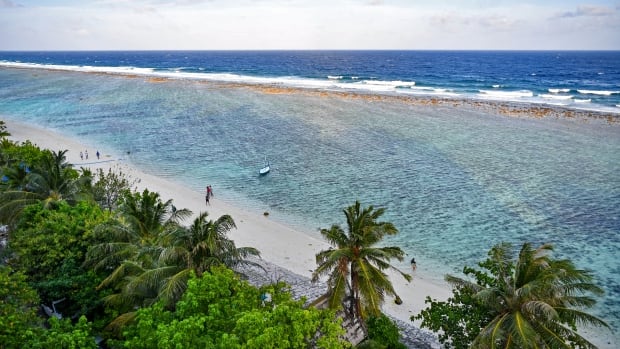It started with a photo of Indian Prime Minister Narendra Modi lounging on a white-sand beach while gazing into the sea and quickly descended into a full-blown diplomatic spat between India and the Maldives, a small island county in the Indian Ocean.
#BoycottMaldives spent days trending on X, formerly known as Twitter. Three Maldivian ministers were suspended for their viral comments calling Modi a “clown” and a “terrorist” on social media, as the country grappled with the fallout and potential threat to its vital tourism industry.
The promotional message that started it all hit Modi’s social media feed in the first week of January — a seemingly innocuous series of tweets extolling the virtues and beauty of Lakshadweep, a string of islands belonging to India and located less than 800 kilometres north of the Maldives.
The prime minister praised the “stunning beauty” of Lakshadweep, and “moments of pure bliss” on the beach. He mentioned that the Indian islands are a must-see for adventurers.
But in neighbouring Maldives, the glowing review was perceived by some as a blatant move to lure tourists away from the archipelago in the Indian Ocean, which relies heavily on tourism. The industry accounts for nearly one-third of the Maldivian economy, according to the World Bank, and Indians send the largest number of visitors to the country, followed closely by Russia.
In addition to the scenic beauty, Lakshadweep’s tranquility is also mesmerising. It gave me an opportunity to reflect on how to work even harder for the welfare of 140 crore Indians. <a href=”https://t.co/VeQi6gmjIM”>pic.twitter.com/VeQi6gmjIM</a>
—@narendramodi
“It was sort of a crisis in the making, which was waiting to happen,” said Shubhajit Roy, diplomatic affairs editor for the English language newspaper the Indian Express, pointing to the mood set in the September election that brought Maldivian President Mohamed Muizzu to power.
The 45-year old former mayor of the capital Malé ran on an “India Out” campaign, with a focus on reducing India’s influence on the archipelago while expanding ties with China.
Muizzu fulfilled one of his campaign promises in the months following his election by announcing his government would be kicking out approximately 80 Indian military personnel stationed in the Maldives.
“It was clear that the new government led by Mohamed Muizzu was on an adversarial path with India on some key issues,” Roy said, adding that the current spat was exacerbated and amplified by “social media diplomacy.”
Public indignation
When the three now-suspended officials from the Maldives made disparaging comments online against Modi, the public indignation was swift and furious from the Indian side, with Bollywood stars and cricketers joining the chorus of people calling for a boycott of the island country.
India’s Ministry of External Affairs summoned the Maldivian envoy for a talking-to about the online insults and one Indian travel site, EaseMyTrip, made good on the boycott threat.
“Our company recently has decided that we will not promote and we will not take further bookings of Maldives from India,” Prashant Pitti, co-founder and executive director of EaseMyTrip, told Indian news agency ANI.
He said his company was fine with forfeiting the financial perks of providing bookings to some of the more than 200,000 passengers who fly from India to the Maldives annually.
“We are letting go of this business as an opportunity to promote our homegrown destinations like Lakshadweep.”
Limited tourist access
But Roy said the comparison is a false one, with the Maldives already an internationally known tourist destination with the necessary infrastructure, while Lakshadweep is underdeveloped and tourist access is limited by the Indian government. Everyone, Indians included, needs an entry permit to visit, with the stated reason being to protect the fragile ecology and natural habitats of the archipelago.
As the diplomatic squabble intensified, the president of the Maldives was on a state visit to China, signing more than 20 agreements to strengthen ties and deepen investment.
Muizzu’s Beijing trip, his second official state visit after a first one to Turkey, was seen as a stark break from tradition, with India historically the first ally a new Maldivian president calls on.
Tour guides and travel agents dependent on Canadian tourists have become the latest in a growing list of collateral damage from the diplomatic crisis between India and Canada.
The strain in the relationship between the two allies is “very jarring and it’s very unsettling for New Delhi,” Michael Kugelman, director of the South Asia Institute at the Washington, D.C.-based Wilson Center, told CBC News.
Even so, the diplomatic row is unlikely to have a lasting impact.
“This spat will not torpedo ties between the two countries, mainly because both countries really need each other,” Kugelman said.

“India certainly does not want to see its relationship with the Maldives drift apart, because then it would have to fear that the Maldives would move even closer to China than it already appears to be now.”
For its part, the island country relies on India for most of its food and infrastructure investments, as well as military training and disaster assistance. India’s post-secondary institutions are also top destinations for its students.
Those strategic factors are the reason both countries appeared keen to dial down the tensions after the initial furor, according to Roy, even though he said Indian officials are concerned about the Maldivian government aligning itself more firmly with China.
“The Indian government cannot ignore the fact that there is a battle of spheres of influence in Maldives,” he said, and that the current government is not as friendly to its closest and most influential neighbour as previous ones were.
“From a very purely strategic perspective, India needs the Maldives on its side to secure its maritime periphery, keep an eye on the Indian Ocean and check the influence of China in its neighbourhood.”



